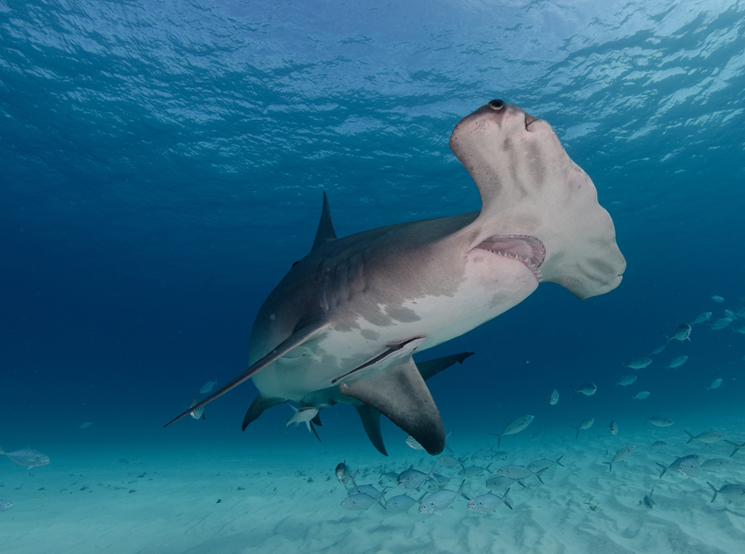|
View: 1830|Reply: 1
|
Sharks show novel evolution of immune, cancer-related genes
[Copy link]
|
|
|
Jan. 30, 2017
Sharks show novel evolution of immune, cancer-related genes
Michael Scholl/Provided

Hammerhead Shark
A new study of shark DNA, including from great white and great hammerhead sharks, reveals unique modifications in their immunity genes that may underlie their rapid wound healing and possibly higher resistance to cancers.
This finding brings researchers a few steps closer to understanding, from a genetic sense, why sharks exhibit some characteristics that are highly desirable by humans.
Sharks and rays are known to be highly efficient wound healers, and it is suspected they show a greater resistance to cancerous malignancies. These properties are likely tied to the functioning of their immune systems, fine-tuned over 400 million years of evolution.
A study published Jan. 30 in thejournal BMC Genomics provides the first evidence that some shark and ray immunity genes have undergone evolutionary adaptation that may be tied to these novel immune system abilities.
The study was co-led by Michael Stanhope, Cornell professor of population medicine and diagnostic sciences, and Mahmood Shivji, director of the Save Our Seas Shark Research Center and the Guy Harvey Research Institute at Nova Southeastern University. Nicholas Marra, a postdoctoral associate in Stanhope’s lab, is the paper’s first author.
Two shark immune genes, legumain and Bag1,stand out.Both of these genes have counterparts in humans, where their overexpression is known to be associated with a range of cancers. The new research shows that these genes in sharks, however, have become modified through evolutionary natural selection.
“The signal of selection in these specific shark immunity genes is especially intriguing in the context that they are involved in promoting cancer in humans, while at the same time sharks are suspected to have higher resistance to cancers,” said Shivji.
The Bag1gene, for example, codes for a protein that in humans is involved in inhibiting an essential natural process known as apoptosis, or programmed cell death. This is important because the programmed cell-death process works to eliminate dysfunctional cells, and one of the hallmarks of cancer is the ability of malignant cells to evade this process. The shark-specific signature of adaptation found in the Bag1 gene may indicate an alternative or modified role for this gene that could alter its tendency to inhibit programmed cell death in sharks.
In addition, shark DNA sequences provide clues that may explain their rapid wound healing abilities despite being immersed in seawater, whose bacteria could be expected to cause infection in open wounds. The research team found that compared with bony fishes, the four species of sharks and ray examined not only had a much higher proportion of genes involved in antibody-mediated immunity, but also that several of the infection immunity-related genes were expressed only in the sharks and rays.
“This higher proportion of genes involved in adaptive [antibody] immunity function could be a key reason behind the infection-fighting and fast wound-healing abilities of sharks and rays,” Stanhope said. “Previous studies of the shark immune system have already yielded some surprises in terms of antibody structure, and these new genetic findings further add to the box of biological novelties in this highly successful vertebrate lineage.”
http://www.news.cornell.edu/stories/2017/01/sharks-show-novel-evolution-immune-cancer-related-genes
|
Rate
-
1
View Rating Log
-
|
|
|
|
|
|
|
|
|
| |
|